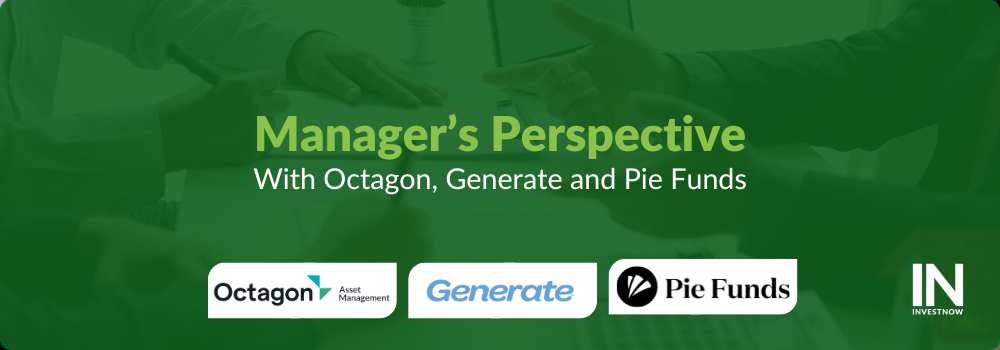
Are you prepared for the true cost of retirement in NZ and is your KiwiSaver enough to get you there?
Welcome to the July 2025 Manager’s Perspective. Each month, InvestNow invites our investment managers to discuss our monthly theme. This month, we asked Octagon, Generate, and Pie Funds some questions to help you better understand their investment styles, strategies, and perspectives on Retirement Readiness. Read the questions and their responses below.
Paul Robertshawe
Chief Investment Officer
Octagon Asset Management


Q1: The InvestNow Retirement Readiness Index showed that the vast majority of Kiwis surveyed had little or no confidence that the pension and KiwiSaver will deliver what they need for retirement – what key steps should individuals take today to achieve a more comfortable retirement?
The index highlights a troubling lack of confidence among Kiwis about their retirement readiness, but it’s important to know that practical steps can be taken today to change that outlook.
The first and most critical step is to create a clear retirement plan. This involves deciding when you want to retire and what kind of lifestyle you hope to enjoy—whether it’s early retirement, travel-focused, or something more modest. Setting clear goals helps determine how much you’ll need and how to allocate your spending over time. Online retirement calculators can help estimate future needs, factoring in inflation, expenses, and life expectancy.
Maximising KiwiSaver contributions is also essential. While the minimum is 3%, contributing more—such as 6% or 10%—can lead to far better outcomes over time thanks to compounding. Young investors, in particular, benefit greatly from staying invested in growth-oriented funds, as time in the market is more powerful than trying to time it.
Beyond KiwiSaver, it’s wise to diversify your investments. A mix of managed funds, shares, exchange-traded funds (ETFs), and, for some, property, can offer better flexibility and resilience. Relying solely on KiwiSaver is likely to leave gaps in your retirement income, especially if you retire early or live longer than expected.
Finally, seeking professional financial advice can make a meaningful difference. Research shows that those who receive advice feel more confident and are generally better prepared for retirement. Planning ahead for both longevity and unexpected costs ensures you’re financially secure and more in control of your future.
Q2: With people living longer and costs rising, how should individuals adjust their investment strategy as they approach retirement age to ensure retirees don’t outlive their savings?
The traditional approach of shifting entirely to conservative, income-focused investments at age 65 is becoming outdated. With people living longer, healthier, and more active lives in retirement, a more flexible and growth-oriented strategy is often necessary. The growing emphasis on decumulation strategies—how retirees draw down their savings—is a positive shift, and having a clear, well-considered plan is essential.
Rather than abandoning growth assets altogether, a sound approach involves gradually adjusting the asset mix. Retirees should aim to reduce exposure to market volatility while maintaining enough growth to keep pace with inflation. Especially in the early years of retirement, keeping a portion of the portfolio in equities can help ensure long-term sustainability. Being overly conservative can be just as risky as being too aggressive, as it may not provide the returns needed to offset rising living and healthcare costs.
Liquidity is also critical. Retirees should avoid being forced to sell long-term growth assets during downturns. Keeping two to three years of expenses in cash or short-term fixed income instruments can provide a buffer during volatile periods, helping to preserve capital and avoid panic selling.
Protecting against inflation is another key concern. Costs for essentials such as food, housing, and healthcare tend to rise steadily over time. Investing in assets that can grow in real terms—such as infrastructure funds, defensive equities, or inflation-linked bonds—can help maintain purchasing power.
Finally, having a clear retirement income plan alongside the investment strategy is vital. Coordinating withdrawals from KiwiSaver, NZ Superannuation, property equity, or investment accounts with expected spending and tax considerations can help extend savings. In some cases, guaranteed income products like annuities can offer added security. Regular reviews with a financial adviser ensure the plan evolves with changing needs and circumstances.
Q3: From your perspective, what investment approaches or asset mixes tend to work best for Kiwis aiming for a secure and comfortable retirement?
I think the first thing to say here is that every person is different, and my answers are general in nature and not meant as personal financial advice!
That said, the most effective retirement investment approach is one that balances growth, stability, and simplicity. Retirement is not just about hitting a financial goal—it’s about preserving a lifestyle without constant financial stress.
A strong retirement strategy rests on three key pillars: a well-diversified asset mix, sufficient liquidity to cover a couple of years of expenses, and a dedicated emergency fund.
Diversification is essential to reduce risk and improve resilience. For most Kiwis a KiwiSaver scheme or managed fund with exposure to both local and global assets offers an accessible, cost-effective way to achieve this. Relying solely on New Zealand’s small and concentrated market may increase vulnerability, so global exposure adds low-cost diversification.
Liquidity is also vital. Retirees who need to sell growth assets during market downturns to cover living costs risk crystallising losses and shortening the life of their portfolios. Having liquid funds on hand can prevent that.
And finally, an emergency fund for when the unexpected happens. Whether it’s a medical bill, a major home repair, or helping family, these costs can strain retirement plans. Create a separate fund and avoid dipping into your long-term investments.
For those with property it will likely also play a role, but decisions around downsizing or selling the family home are complex and often highly emotional. While downsizing may make financial sense, it’s often a deeply personal decision that involves multiple lifestyle trade-offs.
In the end, a low-stress investment strategy focused on diversification, liquidity, and preparation gives retirees the best chance of enjoying retirement with both financial confidence and peace of mind. It ensures your money continues working for you—quietly, efficiently, and with minimal complexity.
Disclaimer: This article has been prepared in good faith based on information obtained from sources believed to be reliable and accurate. This article does not contain financial advice. Octagon Asset Management is the investment manager for Octagon Investment Funds and the Summer KiwiSaver scheme.
Kristian James
Head of Distribution
Generate


Q1: The InvestNow Retirement Readiness Index showed that the vast majority of Kiwis surveyed had little or no confidence that the pension and KiwiSaver will deliver what they need for retirement – what key steps should individuals take today to achieve a more comfortable retirement?
The Financial Services Council released a report with similar findings, and it highlights a scary reality for many Kiwis. It should be a concern for all of us. After all, it’s our collective taxes that help fund NZ Super, and there’s a real risk it won’t be enough for many people to retire comfortably.
That’s why at Generate, we place so much emphasis on the value of advice. Your KiwiSaver account should give you confidence about the future — not uncertainty. But that only happens when you understand your options and make informed choices that align with your goals.
Some of the general advice we often share includes:
- Choose a fund that suits your investment time frame and risk profile. Too many remain in default or conservative funds when you could be in more suitable funds. Understanding your investment timeframe and risk profile will help you choose the fund that is right for you. Choosing the right fund can mean the difference in tens of thousands of dollars by retirement, if not more.
- Review and adjust your KiwiSaver contribution rate. Setting the right contribution rate can help you achieve your goals. Your ability to increase contribution rates may change over time too, so we recommend regularly reviewing your ability to contribute more. A small increase from where you currently are could make a substantial difference over time. You can see how this works in our calculator https://www.generatewealth.co.nz/kiwisaver-calculator/.
- Top up your KiwiSaver account with voluntary contributions. Additional contributions—even small ones—help build momentum toward your goals These benefit from compounding returns, which can give your retirement savings an extra boost. Saving for retirement is more than ‘set and forget’, it’s about being intentional and taking an active interest in your retirement goals. It’s then about implementing the right strategies and regularly reviewing these to ensure that you continue on the right path.
Q2: With people living longer and costs rising, how should individuals adjust their investment strategy as they approach retirement age to ensure retirees don’t outlive their savings?
With life expectancy increasing and the cost of living on the rise, many retirees are now facing the challenge of funding 20–30 years of post-work life. That means the old rule of thumb — switching to a conservative fund at 65 — may no longer be the best advice for everyone.
Rather than basing your fund choice on age alone, it’s more important to consider when you’ll actually need to access your money. Many Kiwis are working longer or phasing into retirement gradually, which means they may not need to start drawing down their KiwiSaver at 65.
If you don’t plan to use your savings until age 70 or beyond, it could make sense to remain in a growth-oriented fund a bit longer — or even consider splitting your investment between a growth and conservative fund to balance preservation with continued growth potential.
It’s also worth noting that you’re not required to withdraw all your KiwiSaver savings at retirement age. Your account can remain active, invested, and earning returns for as long as you like. That flexibility means you can access what you need, when you need it, while still benefiting from market growth and fund performance over time.
Many retirees choose to set up regular withdrawals, effectively giving themselves a steady income while keeping the rest of their balance invested. This approach can help stretch your savings further and provide peace of mind that your money continues to work for you in retirement.
Ultimately, it comes down to planning ahead, getting good advice, and matching your KiwiSaver strategy to your real retirement timeline — not just your age.
Q3: From your perspective, what investment approaches or asset mixes tend to work best for Kiwis aiming for a secure and comfortable retirement?
It really depends on what you mean by “retirement.” Are we talking about reaching KiwiSaver access age at 65? Or are we talking about someone who’s actually planning to stop working and start drawing down their savings? It also depends on how much they’ll rely on their KiwiSaver account, and when they’ll need to start using those funds.
So from our perspective, the most important thing you can do is actually just get advice early. Sitting down with an adviser to build a plan that balances growth, income, and risk management is key. It needs to be tailored to your life stage, your goals, and how you plan to use your money.
There’s no one-size-fits-all answer. The right investment strategy is the one that fits your retirement timeline, your needs, and your comfort with risk. And it’s not a “set and forget” decision either — staying informed and making adjustments along the way is just as important.
Disclaimer: No part of this article is intended as financial advice; it is intended as general information only. To see a copy of Generate’s Financial Advice Provider Disclosure Statement or Product Disclosure Statements, see www.generatewealth.co.nz/disclosures. The issuer is Generate Investment Management Limited.
James Paterson
Chief Client Officer
Pie Funds


Q1: The InvestNow Retirement Readiness Index showed that the vast majority of Kiwis surveyed had little or no confidence that the pension and KiwiSaver will deliver what they need for retirement – what key steps should individuals take today to achieve a more comfortable retirement?
My advice is to take proactive steps now and avoid delaying important decisions.
- For most homeowners, the primary objective should be to repay their mortgage as quickly as possible. This is often the most effective form of saving, as it reduces your future outgoings and therefore lowers the income required to maintain your lifestyle in retirement.
- KiwiSaver is an excellent investment tool, with the added benefit that employers are legally required to contribute to it on your behalf. Ensure you are enrolled and contributing regularly. Small contributions accumulate significantly over time. If you do not have a mortgage or struggle with a savings discipline, consider contributing more than the minimum required to build a larger retirement nest egg.
- Determine how much you will actually need in retirement. Saving without a clear understanding of your required retirement income is unlikely to lead to an optimal outcome. Sorted’s retirement calculator is a great tool to help work this out: https://sorted.org.nz/tools/retirement-calculator/
- Plan and start saving early. Planning for retirement early offers numerous advantages that can significantly enhance your financial security, peace of mind and lifestyle in later years. You can contribute smaller amounts over time instead of making large contributions later. This spreads the savings burden across decades, making it more manageable and less stressful.
- Finally, live within your means. If you’re living paycheque to paycheque, it is essential to take decisive action now to establish a savings plan for when employment income ceases.
Q2: With people living longer and costs rising, how should individuals adjust their investment strategy as they approach retirement age to ensure retirees don’t outlive their savings?
Generally, the higher the level of risk taken within an investment portfolio or KiwiSaver fund, the greater the potential returns over the long term. With life expectancies continuing to rise, adopting a lower-risk approach in retirement may not always be prudent. Maintaining a higher-risk strategy could maximise returns and help ensure your funds last throughout retirement. A conservative strategy is of little comfort if it results in running out of money a decade too early.
Additionally, you may need to consider extending your working life and delaying retirement. If you are physically and mentally able, work can provide continued meaning and purpose, and transitioning to part-time work is always an option.
If financial circumstances become challenging in retirement, selling your home and moving into a rental property can be a practical way to release capital and improve your financial situation.
Q3: From your perspective, what investment approaches or asset mixes tend to work best for Kiwis aiming for a secure and comfortable retirement?
In short, diversification is key. A portfolio with a high exposure to shares generally performs best over time, particularly when there is no immediate need to draw on the capital invested. However, many investors make the mistake of focusing solely on assets that have performed well in the recent short term, leading to insufficient diversification.
A robust investment strategy involves holding a mix of Australasian, United States, and global companies, ensuring that poor performance in one economy may be offset by stronger performance elsewhere. Sectors such as AI and technology continue to demonstrate strong growth and are reshaping global markets, so maintaining meaningful exposure to these sectors is important.
However, when you begin drawing on your retirement savings, increasing allocations to lower-risk assets such as bonds and cash will help reduce portfolio volatility and provide more stable, predictable performance.
Disclaimer: Information is current as at 28 July 2025. Pie Funds Management Limited (“Pie Funds”) is the issuer and manager of the funds in the Pie Funds Management Scheme and the Pie KiwiSaver Scheme (“Schemes”), the product disclosure statements of which can be found at www.piefunds.co.nz. Any advice is given by Pie Funds and is general only. Our advice relates only to the specific financial products mentioned and does not account for personal circumstances or financial goals. Please see a financial adviser for tailored advice. You may have to pay product or other fees, like brokerage, if you act on any advice. As manager of the Schemes, we receive fees determined by your balance and we benefit financially if you invest in our products. We manage this conflict of interest via an internal compliance framework designed to help us meet our duties to you. For information about how we can help you, our duties and complaint process and how disputes can be resolved, or to see our disclosure statement, please visit www.piefunds.co.nz. Please let us know if you would like a hard copy of this disclosure information.
Disclaimer
The following commentaries represent only the opinions of the authors. Any views expressed are provided for information purposes only and should not be construed in any way as an offer, an endorsement or inducement to invest. All material presented is believed to be reliable but we cannot attest to its accuracy. Opinions expressed in these reports may change without prior notice.
This article is made available by InvestNow Savings and Investment Service Limited (“InvestNow”). The information and any opinions in this publication are based on sources that InvestNow believes are reliable and accurate. InvestNow, its directors, officers and employees make no representations or warranties of any kind as to the accuracy or completeness of the information contained in this publication and disclaim liability for any loss, damage, cost or expense that may arise from any reliance on the information or any opinions, conclusions or recommendations contained in it, whether that loss or damage is caused by any fault or negligence on the part of InvestNow, or otherwise, except for any statutory liability which cannot be excluded. All opinions and market commentary reflect InvestNow’s judgment on the date of this publication and are subject to change without notice. This disclaimer extends to any entity that may distribute this publication. The information in this publication is not intended to be financial advice for the purposes of the Financial Markets Conduct Act 2013, as amended by the Financial Services Legislation Amendment Act 2019. In particular, in preparing this document, InvestNow did not take into account the investment objectives, financial situation and particular needs of any particular person. Professional investment advice from an appropriately qualified adviser is recommended before making any investment decision. All investments involve risk.

Leave A Comment